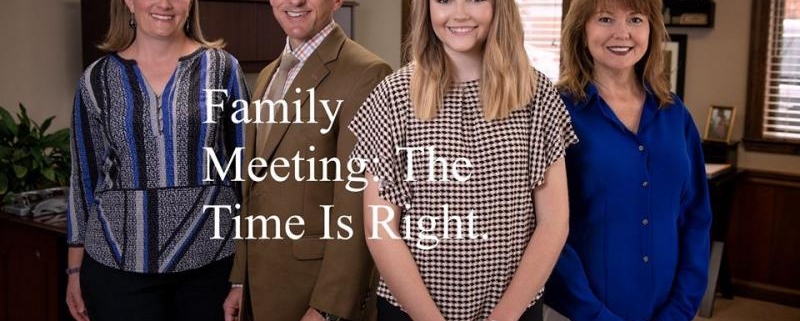Family Meeting: The Time Is Right.
We live busy, hectic lives. Because of that, it’s easy to put off doing important things, such as planning for the future. Yet we know we’ll have to face certain things in the future, including our retirement, our potential need for assisted living and nursing home care, and our death.
While we may be in full control of all aspects of our lives for a few of those events, we won’t be in control for all of them. And, frankly, we probably won’t have as much control of any of them as we would like. That means other people will be involved, too. Our financial advisors, our accountant, our insurance agent, and our estate planning/elder law attorney should be involved. But those closest to us, such as our spouse, children, siblings, and maybe even our parents will play important roles and shoulder a heavier burden at those times. So we should consider what each role is likely to be and take steps to make it as easy as it can be on them and us. One way to do that is through a family meeting.
What Is a Family Meeting?
A family meeting can take many different forms. It can be a scheduled time set aside for the meeting. Or it can be impromptu when most or all of those who should be involved are present. Family meetings around the holidays are very common because, even in our busy lives, we usually carve out enough time to visit around Thanksgiving or Christmas.
Regardless of the formality or impromptu nature of how the meeting arises, it involves an ingredient that can’t be overvalued: communication. Communication is the hallmark and focus of a family meeting.
What Is Communicated in a Family Meeting?
Parents usually initiate a family meeting. But, occasionally, children will initiate a family meeting. This is most common when a meeting should occur and no one else is stepping up to coordinate it.
Whether the parent or a child initiates the meeting, the meeting sets the stage for the parent to tell others their wishes. They may explain who they want to serve in fiduciary roles such as executor, trustee, or attorney in fact. They may tell the family how they feel about organ donation, life support, and end-of-life care. They may tell the family how they want their assets distributed after their death. And they may take this opportunity to tell stories of their life that have been important to them, to reflect on good times, and to spread the love and value they have for their family. Much good can come from a family meeting. But be prepared for some challenges that can arise.
What Challenges Arise with Family Meetings?
When we get frank, open communication from others, we may hear things that sting. I’ve heard plenty over the years. It’s not easy to take. But we can grow and benefit from even the toughest truth.
Family meetings allow for frank, open communication. And all involved need to truly listen to what is said and how it is said. It’s an important show of respect to everyone else who is there.
In the meeting, we may disagree. Can we express disagreement with patience and kindness? Hopefully so. But consider if an even better option is keeping our mouth shut. We must remember our role in the meeting. If we are a child whose parent is explaining what is important to them, is it proper for us to tell them why we disagree with them and why we want it a different way? Probably not, and that’s especially true if others there are giving us the “I wish you would shut up” look when we start talking. Even though communication is good, it’s not always easy.
Why Have a Family Meeting?
Have a family meeting because it allows those who care for you to know what matters most to you and so that you will know what matters most to those you care about.
Have a family meeting because it opens a door for communication that will lessen the opportunity for misunderstanding.
Have a family meeting because you don’t want to one day find yourself saying “I wish we had talked about that.”



